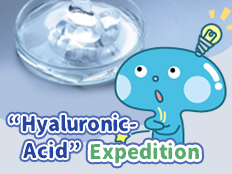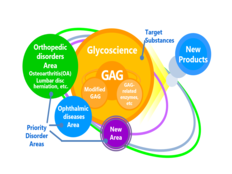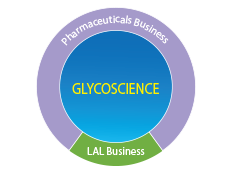The following are the principle risks that could have a material effect on the operating results and the financial situation of the Seikagaku Corporation.
Many of the Seikagaku Group’s products affect people’s lives and health and, consequently, are subject to legal regulations for ensuring the quality, efficacy, and safety of pharmaceuticals and other products imposed by regulatory authorities in Japan and other countries. Amendments to these related laws and regulations or healthcare system and administrative policy trends, including revisions to the National Health Insurance Drug Price Standard, could affect our business results. Our policy concerning risks arising from amendments to legal regulations, etc. is to promptly ascertain the details of any amendments and respond appropriately by constantly monitoring regulatory trends. However, the Seikagaku Group cannot determine the details or timing of such revisions, and we recognize that it is difficult to assess the impact of such events in advance.
In pharmaceutical products development, the core of Seikagaku’s business, various clinical trials to confirm efficacy and safety are required from the time of basic research to new drug approval. Even if the Company bears enormous R&D expenses over long periods of time, there is risk that products under development will not progress to launch. R&D expenses vary according to R&D progress, and this could affect our business results. We are striving to diversify risk by maintaining multiple development pipelines. Nevertheless, this does not enable us to avoid all risks, and such uncertainties in new product development could affect our business results.
We have entered into exclusive distributorship agreements with sales partners for the pharmaceuticals and medical devices that are our mainstay products, which limits the number of distributors. Changes to the business relationships with these sales partners due to changes in circumstances, depending on the nature of the changes, could affect our business results. Also, we recognize that it is difficult to assess the impact if this risk materializes.
Prescription drugs and medical devices entail the risk of appearance of unanticipated side effects from the clinical trial stage to the post-marketing stage. Materialization of this risk could lead to delays in clinical trials or discontinuation of a product in development. Also, an unanticipated side effect in an approved product could develop into a situation such as a product discontinuation or recall, which could affect our business results. Our policy is to prepare against such risks, continue safety monitoring activities on a regular basis, gather and analyze information on adverse events, and, in the event unanticipated side effects appear, to promptly take measures such as product recalls. Nevertheless, our business results could be affected, depending on the degree of manifested side effects, and we recognize that it is difficult to quantitatively assess the degree of impact. In response to multiple reports of shock or anaphylaxis occurring following administration of the joint function improvement agent JOYCLU, we have issued a Dear Healthcare Professionals Letter of Rapid Safety Communication (Blue Letter) and are gathering and analyzing information on adverse events and strengthening safety monitoring activities. Going forward, if other unanticipated side effects are identified or exacerbation of side effects is confirmed, we may further strengthen countermeasures or take additional measures. In such case, sales revenue from JOYCLU may fall short of initial projections.
Various restrictions apply to the manufacture of pharmaceuticals, and some raw materials require the approval of regulatory authorities. Therefore, the number of raw materials suppliers is limited, and we perform on-site audits and strive to maintain quality and establish a stable supply system. We rely on single-supply sources for certain raw materials. Consequently, any change in circumstances that makes it difficult to procure raw materials could disrupt the manufacture of products and affect our business results. Although we take measures to minimize impact on business results by holding appropriate raw materials and finished goods inventory, materialization of this risk could affect our business results. Since the extent of impact if this risk materializes would vary greatly depending on the products in question, the possibility of procuring substitutes, the time required for procurement, and other factors, we recognize that it is difficult to assess the impact of materialization in advance.
Many of the Seikagaku Group’s products are made using ingredients derived from animals, namely chickens, sharks, and horseshoe crabs, as raw materials. Consequently, any restrictions on the use of animal-derived ingredients as raw materials or difficulty in procuring these ingredients could affect our business results. We are taking measures to minimize any impact on business results by diversifying suppliers to the extent possible and holding appropriate raw materials and finished goods inventory. We are also striving to minimize risk by developing products that use fermented raw materials and by developing clinical trial methods that use genetically modified organisms. Nevertheless, not all risks can be avoided using these methods, and we recognize that materialization of such a risk would unavoidably have some degree of impact on our business results.
We are also striving to minimize risk by launching and developing products that use fermented raw materials and products that use genetically modified organisms. Also, at the Convention on International Trade in Endangered Species of Wild Fauna and Flora (CITES, also called the Washington Convention), held in November 2022, it was decided to regulate a species of shark that Seikagaku uses as a raw material and to require permits for export of this species. The Japanese government has entered a reservation with respect to this species, and the regulation does not apply to trading in the species in Japan. On the other hand, it is highly likely that the permit will become necessary for overseas export of the species, we are responding in cooperation with suppliers, and at this time we do not foresee any impact on trading with current customers. However, an increase in the number of organisms subject to the convention or the number of ratifying countries could have an impact on our business.
The overseas sales ratio in fiscal 2021 was 59.9% (excluding royalties), and our export transactions are denominated mainly in U.S. dollars. Although we endeavour to reduce exchange risks by denominating a portion of R&D expense payments in foreign currencies and entering into foreign exchange contracts, exchange rate trends could affect our business results. Nevertheless, we recognize that it is difficult to avoid all risks using these methods. Also, when preparing the consolidated financial statements, we convert financial statements of overseas consolidated subsidiaries denominated in local currencies to yen. Consequently, exchange rate trends could affect our business results.
We invest cash reserves in marketable securities for the purpose of applying them to future R&D and capital expenditures. Although we endeavor to reduce risks through diversification of investments and other means, price fluctuations of marketable securities and other investment instruments could affect our business results. Since it is difficult to mitigate or eliminate external risks arising from trends in financial markets and monetary policy using our own risk mitigation measures, we believe that our business results would be affected if such risks materialize, depending on the timing and scale, and recognize that it is difficult to quantitatively assess the impact of materialization.
Although we have filed various applications to acquire patent rights and other intellectual property rights for the purpose of securing competitive advantage for our products and businesses, inability to acquire patent or other rights, denial of the validity or exclusivity of patent or other rights that have been acquired, or expiration of the term of patent or other rights could affect our business results. Also, although we conduct investigations to avoid infringement of third-party intellectual property rights and minimize the possibility of infringement, it is difficult to completely avoid the problem of intellectual property rights infringement, and a dispute with a third party arising over intellectual property rights could affect our business results. Also, we recognize that at this time it is difficult to quantitatively assess the impact of future materialization.
In the event that business sites and facilities of the Seikagaku Group incur extensive damage, business activities stagnate, or product supply is disrupted due to an earthquake, typhoon, or other natural disaster, a fire or other accident, or an outbreak of infectious disease, or in the event that major expenses are incurred for the repair of facilities damaged in a disaster, this could have a material impact on our business results.
Although we have taken precautionary measures, including preparation of a manual for responding to various forms of disaster risk, these risks cannot be avoided solely by risk management measures taken by the Group, and materialization of such risks could affect our business results, depending on the timing and scale. Also, we recognize that it is difficult to quantitatively assess the impact of materialization.
A rise in the average temperature of the planet or an increase in the frequency or severAn increase in the frequency or severity of weather disasters associated with climate change could have an impact on our business activities. Furthermore, increases in raw material costs due to the introduction of a carbon tax or other measures in the future because of a rise in the average temperature of the planet could have an impact on our business results. In addition to identifying climate change risks and countermeasures, Seikagaku assesses and discloses information on the extent of climate change impact in accordance with the recommendations of the Task Force on Climate-related Financial Disclosures (TCFD).













